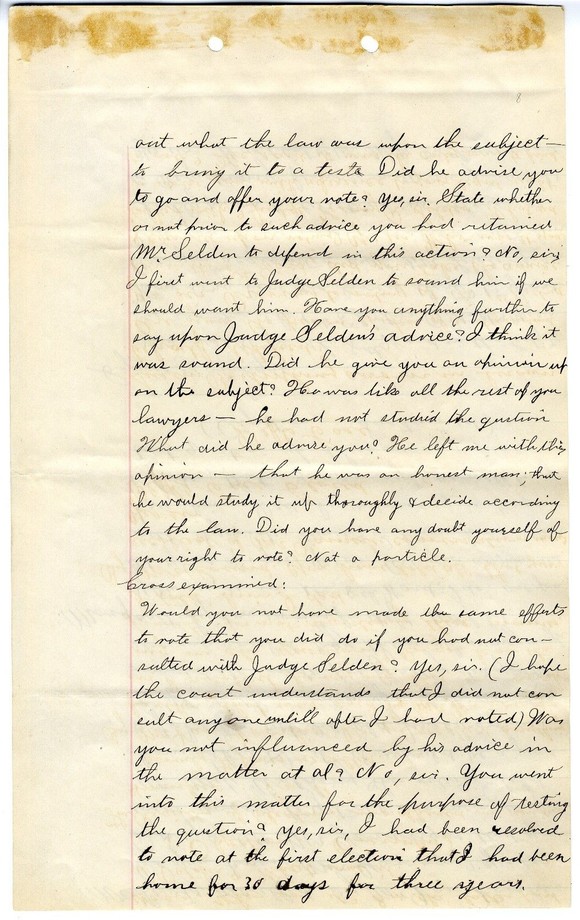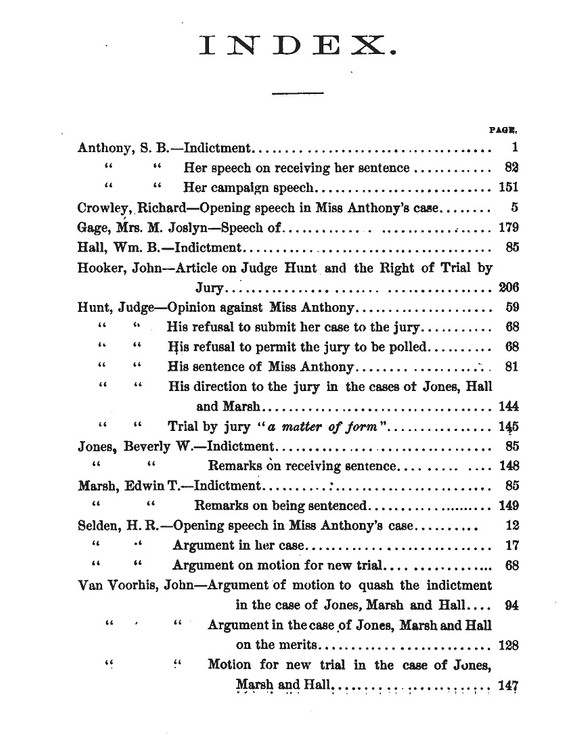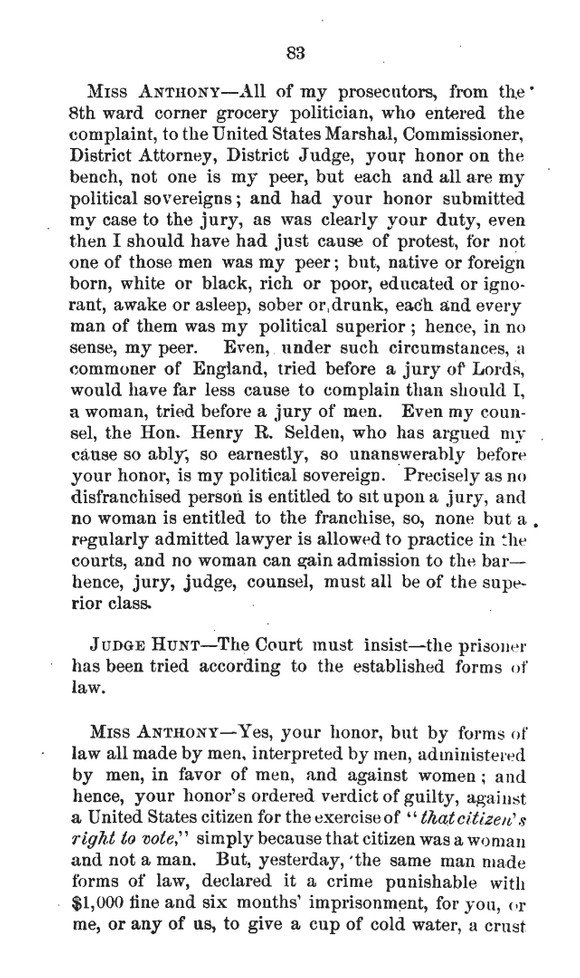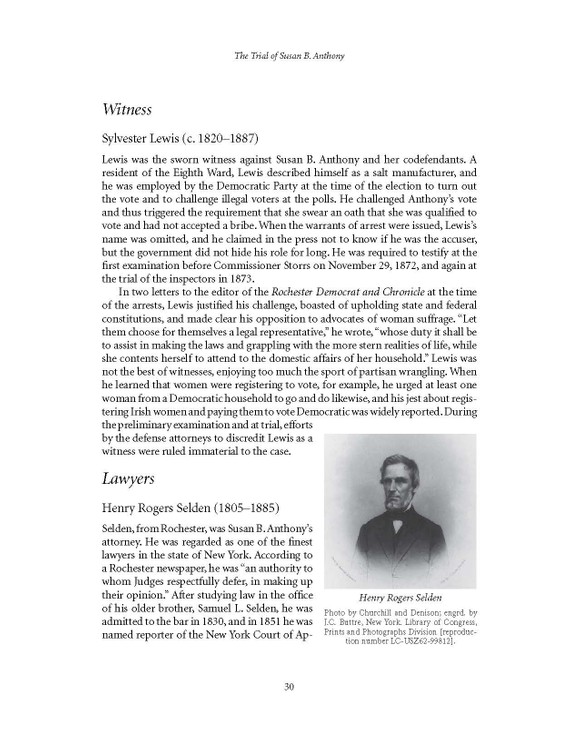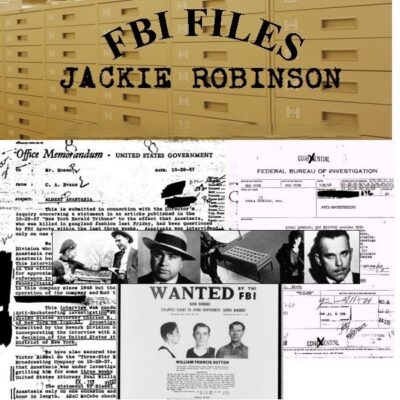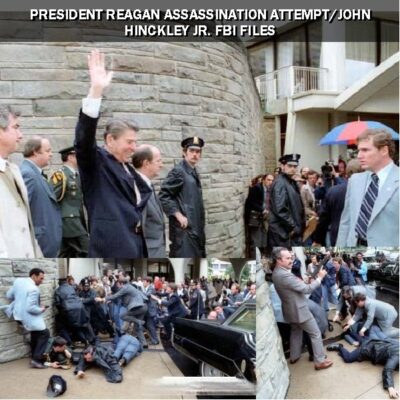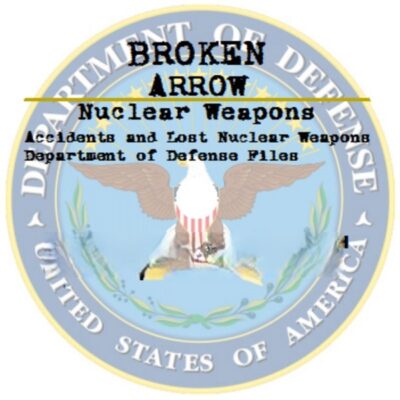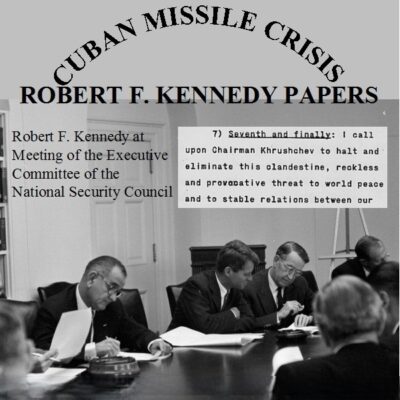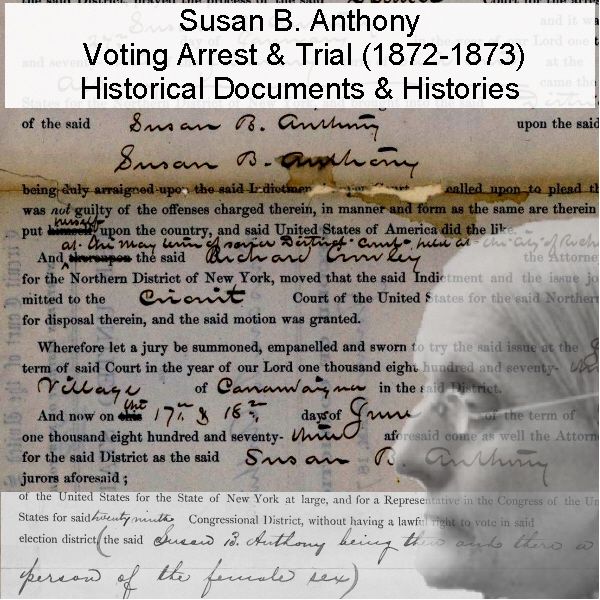
Susan B. Anthony Trial (1872–73): Voting Arrest & Historical Records
$19.50
Description
Susan B. Anthony: Voting, Arrest, and Trial
- November 1, 1872: Susan B. Anthony confronts election official Beverly W. Jones at a barbershop set up as a voter registration office in Rochester, New York. She demands her name be added to the voter list, asserting her right to vote under the 14th Amendment, despite New York state law prohibiting women from voting. Supervisor of Elections Mr. Warner advises Jones to register the women.
- November 5, 1872: Susan B. Anthony, along with thirteen other women, casts a vote in the first election district of the eighth Ward of the City of Rochester during the Presidential Election.
- January 1873 (exact date not specified, but files begin): Criminal case files related to United States v. Susan B. Anthony commence.
- January 24, 1873: Susan B. Anthony is indicted for “knowingly voting without having a lawful right to vote,” specifically for “wrongfully and unlawfully” voting for a candidate for Congress. She is charged under a recent federal law that criminalized voting in congressional elections “without having a lawful right to vote,” in violation of New York state law.
- January 1873 (exact date not specified): An order is issued to the U.S. Marshal to deliver Susan B. Anthony to county jail.
- January 12, 1872 – December 17, 1873: Widespread newspaper coverage across the United States reports on Susan B. Anthony and her case.
- June 1873: Only Susan B. Anthony’s case among the fourteen indicted women is brought to trial.
- June 1873 (during trial): The judge dismisses the jury.
- June 1873 (during trial): The judge finds Susan B. Anthony guilty.
- June 1873 (after conviction): An order is issued to seize property of the convicted Anthony.
- June 1873 (after conviction): A payment report for prosecution witnesses is generated.
- June 1873 (after conviction): An order is issued committing Susan B. Anthony to Albany County Jail.
- June 1873 (after conviction): Susan B. Anthony is fined $100.
- Before the end of 1873: U.S. Attorney Richard Crowley publishes his own pamphlet containing his argument and the judge’s ruling, after refusing Anthony’s request for a copy of his argument.
- Throughout 1873: The trial of Beverly W. Jones, Edwin T. Marsh, and William B. Hall (the inspectors of election who received Anthony’s vote) for permitting women to vote also takes place in New York.
- Undated (published after the trial, possibly 1873 or shortly thereafter): Susan B. Anthony compiles and publishes “An Account of the Proceedings on the Trial of Susan B. Anthony, on the Charge of Illegal Voting, at the Presidential Election in November 1872.” This 220-page book includes the indictment, a trial transcript, her pretrial lectures, a speech by Matilda Joslyn Gage, and an article by John Hooker.
Cast of Characters
- Susan B. Anthony: A prominent leader in the women’s suffrage movement. In 1872, she knowingly voted in the Presidential Election, challenging laws that prohibited women from voting. She was subsequently arrested, indicted, and tried in federal court, ultimately being found guilty and fined. She compiled and published an account of her trial to publicize her arguments.
- Beverly W. Jones: An election official in Rochester, New York. He was confronted by Susan B. Anthony on November 1, 1872, when she demanded to be registered to vote. He, along with Edwin T. Marsh and William B. Hall, was later tried for permitting women to vote.
- Mr. Warner: The Supervisor of Elections in Rochester, New York. During Susan B. Anthony’s voter registration attempt on November 1, 1872, he advised Beverly W. Jones to register the women.
- Edwin T. Marsh: An inspector of election in Rochester, New York, who received Susan B. Anthony’s vote. He was later tried for permitting women to vote.
- William B. Hall: An inspector of election in Rochester, New York, who received Susan B. Anthony’s vote. He was later tried for permitting women to vote.
- Richard Crowley: The U.S. Attorney who prosecuted Susan B. Anthony’s case. He refused Anthony’s request for a copy of his argument but later published it in a pamphlet.
- Matilda Joslyn Gage: Her speech is included in “An Account of the Proceedings on the Trial of Susan B. Anthony.” (Her specific role in the trial is not detailed beyond this inclusion).
- John Hooker: His article on the right of trial by jury is included in “An Account of the Proceedings on the Trial of Susan B. Anthony.” (His specific role in the trial is not detailed beyond this inclusion).
She Voted, She Was Arrested – Susan B. Anthony Trial Docs
Historical Materials on Susan B. Anthony’s Arrest and Legal Proceedings for Casting a Ballot (1872-1873)
This collection comprises 744 pages of judicial records, press reports, and historical accounts concerning Susan B. Anthony’s detainment and legal case for participating in an election. She cast her ballot on November 5, 1872, within the confines of Rochester City’s Eighth Ward, specifically in its inaugural voting precinct. In 1873, Susan B. Anthony was among fourteen women who faced arrest and formal charges, accused of “deliberately casting a ballot without legal entitlement.” However, only Ms. Anthony’s particular legal dispute proceeded to a judicial hearing in June 1873; during these proceedings, the presiding judge discharged the jury, declared her culpable, and imposed a hundred-dollar penalty. The compiled records feature:
Legal Records from the Case of United States against Susan B. Anthony
These include 149 pages of materials pertaining to the criminal proceedings, spanning from January to July of 1873. Among these documents are records from U.S. v. Susan B. Anthony, including the formal charge dated January 24, 1873, for unlawful suffrage. This accusation specifically states that Susan B. Anthony “improperly and illegally” cast a vote for a congressional hopeful representing Rochester, New York (a formal charge for casting a ballot in a federal election without legal eligibility in that specific electoral district, given that Susan B. Anthony was at that time a woman).
The legal proceedings against her underscored the intricate nature of the relationship between federal and state powers during the era following the Civil War. A federal judicial body found her guilty, based on federal legislation, for contravening state statutes that defined voter qualifications. While New York’s state statutes forbade women from participating in elections, a contemporary federal act allowed for criminal charges against any individual who cast a ballot in national legislative contests “without legal permission to vote.”
Also featured is the sworn statement of Mr. Beverly W. Jones, an electoral officer in Rochester, New York, with whom Susan B. Anthony interacted on November 1, 1872. He recounted his interaction with Ms. Anthony, who entered a barbershop converted into a voter registration point and insisted upon the inclusion of her name on the electoral roster. He stated, “…I expressed my doubt regarding our ability to register her.
She inquired about the basis for my reservation. I informed her that the New York State Constitution conferred voting rights exclusively upon male citizens. She then questioned whether I was familiar with the 14th Amendment of the U.S. Constitution, to which I affirmed.” “She sought clarification on whether the amendment designated her as a citizen with voting privileges. At that moment, Mr. Warner, the overseer of elections, interjected, ‘My friend, how will you circumvent that provision? I believe you will be compelled to enroll their names’—or uttered words to a similar effect.”
This collection further contains: A directive instructing the U.S. Marshal to transfer Susan B. Anthony to the local detention facility; a mandate to confiscate assets belonging to the convicted Anthony; a fiscal report detailing payments to witnesses for the prosecution; a decree for Susan B. Anthony’s committal to Albany County Jail; and transcribed records, encompassing witness cross-examinations conducted by both defense and prosecuting counsel, as well as Susan B. Anthony’s own declaration in her defense. Also included is a record detailing the events of the judicial proceedings concerning Susan B. Anthony.Regarding Anthony, Indicted for Unlawful Voting, at the Presidential Election in November 1872
This 220-page volume was released by the Daily Democrat and Chronicle in Rochester, New York. To maintain an exhaustive document of the legal proceedings and disseminate her perspectives, Anthony assembled this narrative, incorporating the formal charges, a verbatim record of the court hearing, her addresses delivered before the trial, a presentation given by Matilda Joslyn Gage, and a piece by John Hooker concerning the entitlement to a jury trial. Its complete designation is: A Record of the Events from the Prosecution of Susan B. Anthony, concerning the Accusation of Unlawful Suffrage, during the Presidential Election in November 1872, and from The Court Case of Beverly W. Jones, Edwin T. Marsh, and William B. Hall, the Voting Officials who Accepted her Ballot. The submission from U.S. Attorney Richard Crowley is absent from the “Record of the Proceedings.” He declined to furnish Anthony with a duplicate. Nevertheless, by late 1873, Crowley issued his own brochure, detailing his legal reasoning and the exact text of the judicial decision in the matter.
The Trial of Susan B. Anthony by Ann D. Gordon (2005)
This publication, “The Trial of Susan B. Anthony,” was penned by Ann D. Gordon, who serves as the Editor for the Papers of Elizabeth Cady Stanton and Susan B. Anthony at Rutgers University. It was developed for the “Federal Trials and Major Debates in American History” initiative by the Federal Judicial Center. This resource examines every facet of the legal proceedings in the case known as United States versus Susan B. Anthony. It investigates the judicial inquiries presented to the tribunals, the courtroom contentions put forth by opposing parties, and the reportage from news outlets and journalists. Verbatim copies of historical material pertaining to the litigation are also provided.
American State Trials Excerpts
Sixty-nine pages have been extracted from the multi-volume compilation titled “American State Trials: A Compendium of Significant and Intriguing Criminal Prosecutions Occurring in the United States, from the Nation’s Inception to the Current Era, complemented by Commentary and Explanations.” These excerpts detail the legal process involving Susan B. Anthony, along with the judicial hearing of Beverly W. Jones, Edwin P. Marsh, and William B. Hall for allowing women to cast ballots, which transpired in New York in 1873.
Newspaper Coverage
This comprises 158 complete broadsheet newspaper pages originating from various parts of the United States, encompassing reports about Susan B. Anthony from January 12, 1872, through December 17, 1873.

